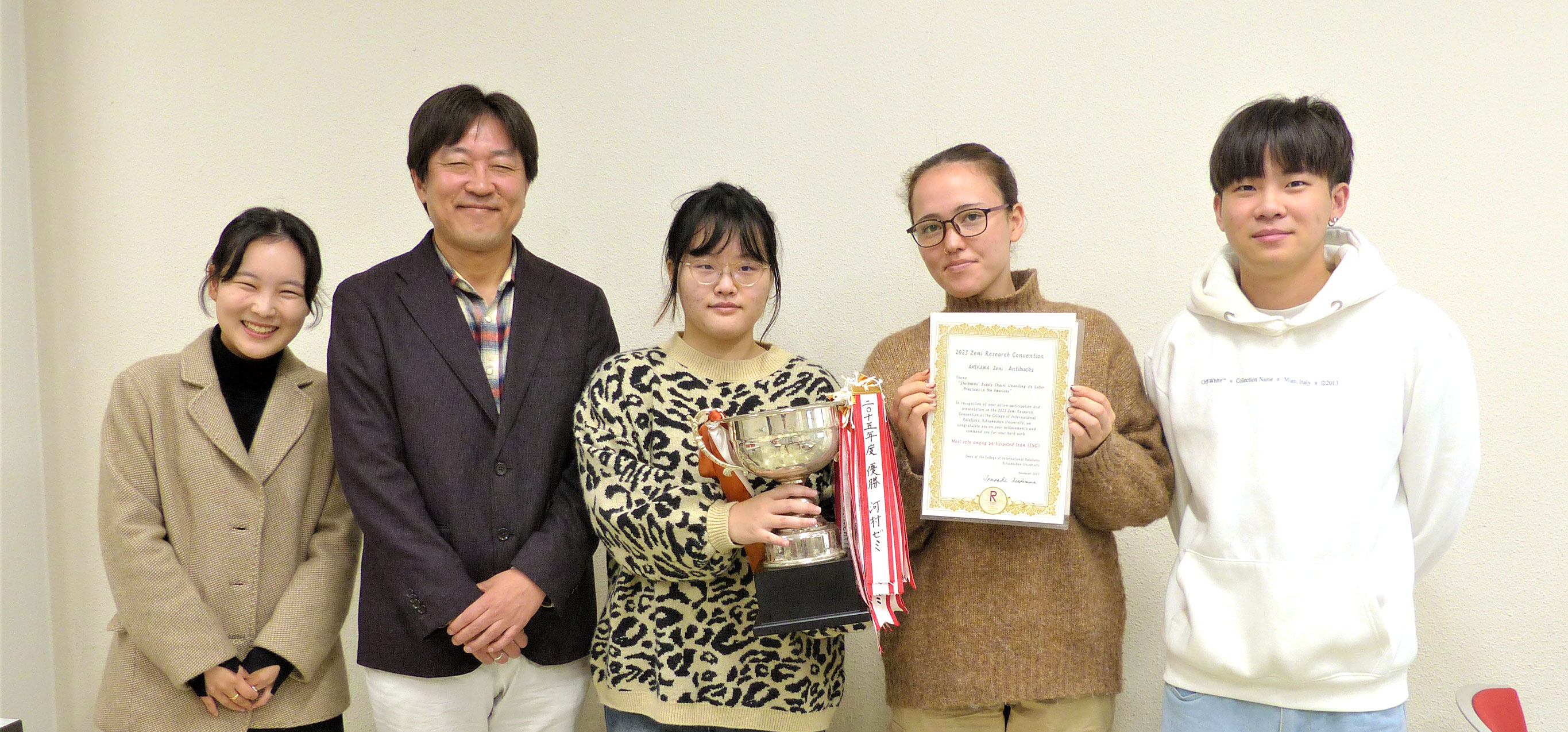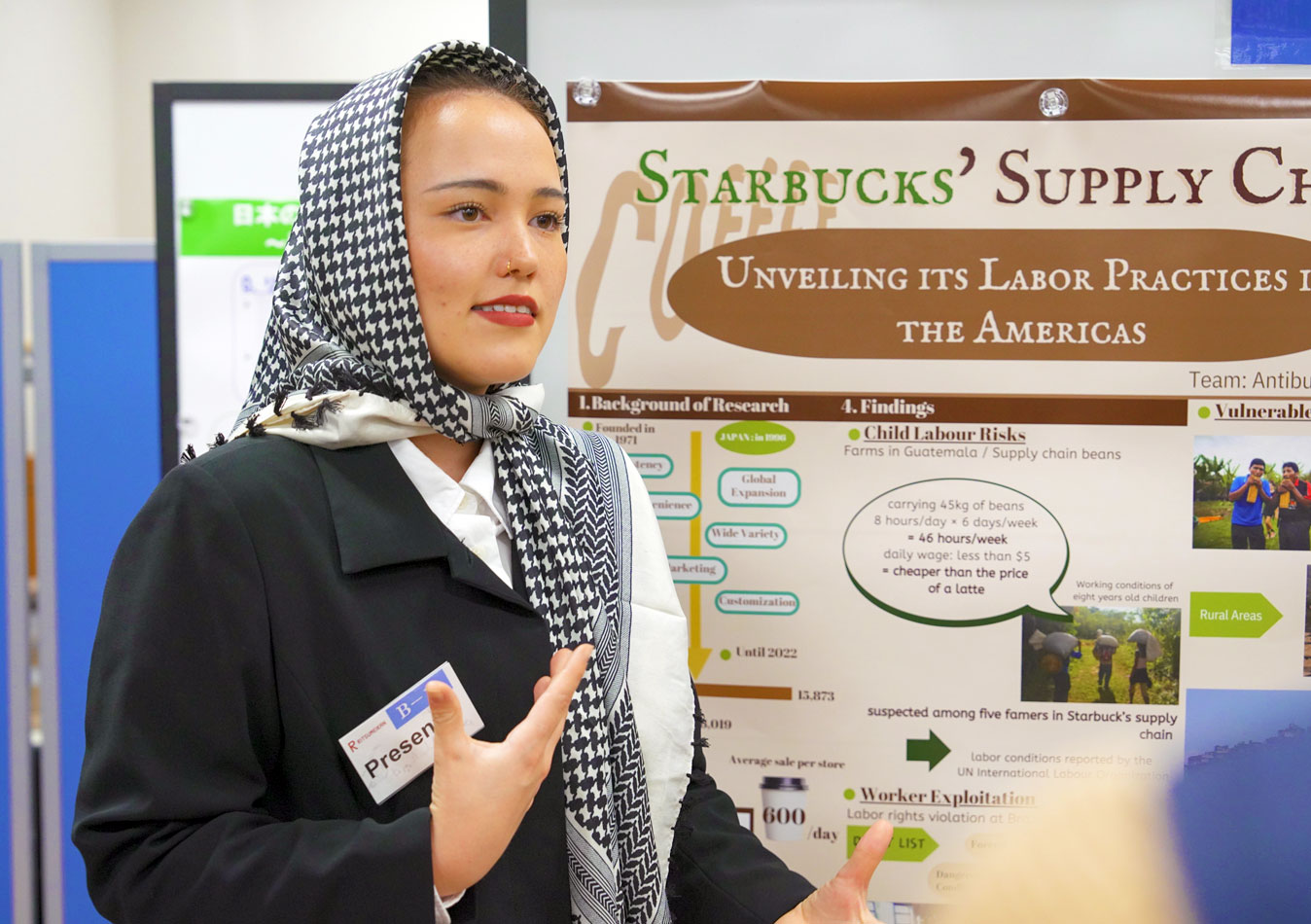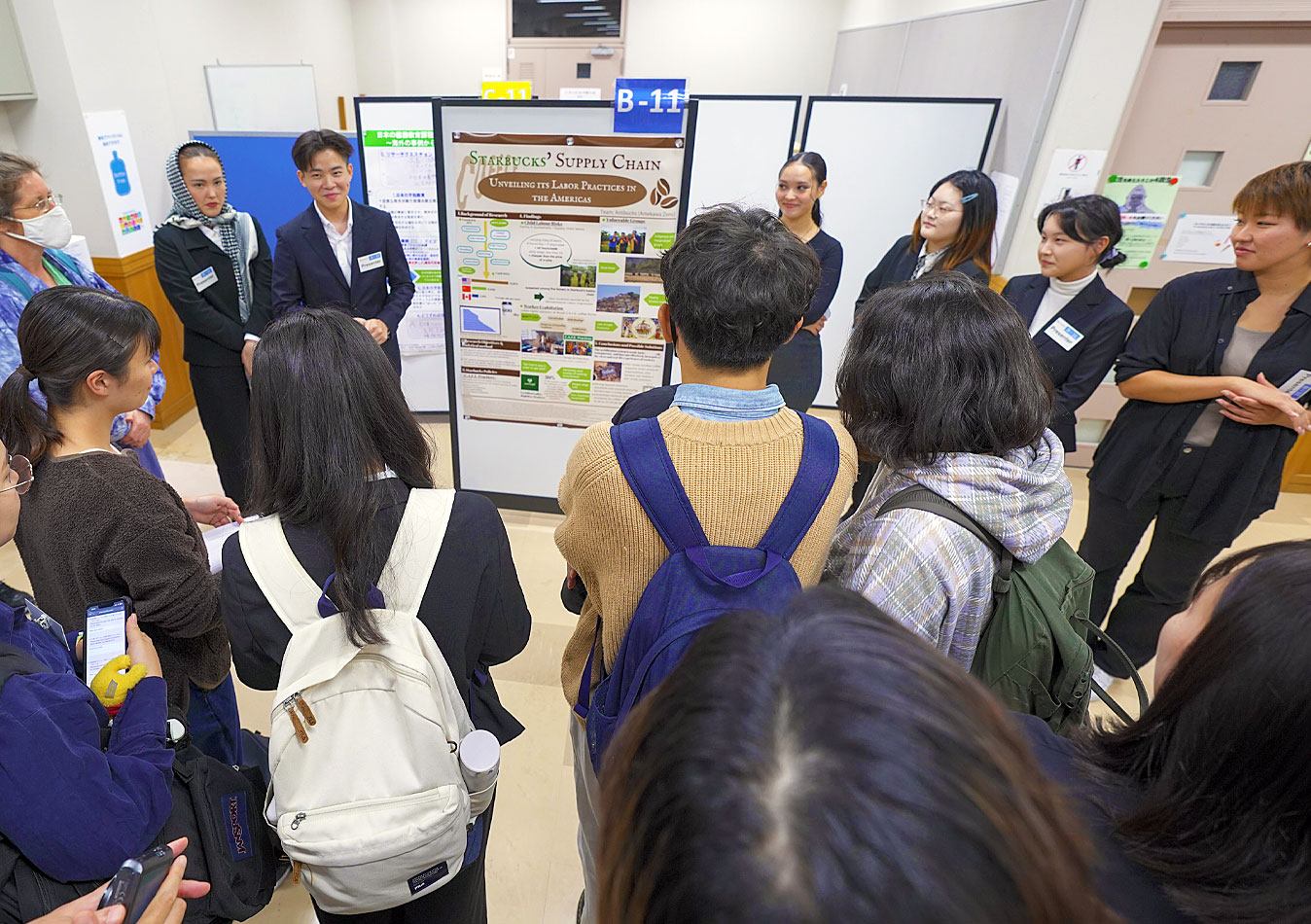
Zemi Research Convention 2023 “Starbucks' Supply Chain: Unveiling its Labor Practices in the Americas”
Amekawa Seminar (team name: Antibucks)
WALKER Mai, MORITA Joh, WU Yongxuan, SUZUKI Daisy, FUKUSHIMA Karin, CHO Heylim
We interviewed the members of the Amekawa seminar (Professor AMEKAWA Yuichiro), who presented "Starbucks' Supply Chain: Unveiling its Labor Practices in the Americas" at the Zemi Research Convention 2023.
Please let us know about your seminar.
Our seminar covers a wide range of research topics related to environmental and development studies, specifically focusing on themes associated with the 17 Sustainable Development Goals (SDGs). We aim to conduct research that can positively impact future sustainable societies, nations, and communities. The diversity of topics among my classmates provides an advantage, allowing us to explore various issues together and broaden our perspectives through their presentations.
Some of the topics covered in our seminar include Drought in The South America Region, Electric Vehicle Movements and Environmental Impacts, Education Gap and Educational Development in Developing Countries, ESG and Green Management in Thailand, Japan’s ODA and JOCV, Waste New Circular System.
Please let us know about your instructor.
As an instructor, Amekawa sensei offers a valuable opportunity to students who are interested in environmental studies and development issues. He is exceptionally inclusive, guiding research topics related to various student’s interests toward more advanced directions. Furthermore, Amekawa sensei fosters active discussions and Q&A sessions with classmates, leading research topics and improvements from the viewpoint of students in a free atmosphere. This proves immensely beneficial, especially when aligning with personal interests or one's thesis topic. His sharp insights help address individual intellectual curiosity by pinpointing key points.

Please give details of your Zemi Research Convention presentation.
Firstly, we delved into Starbucks' Ethical Coffee Farm Evaluation program, C.A.F.E. Practices, outlining its standards for ethically sourcing coffee beans and the third-party verification process overseen by SCS Global Services. We discussed its aim to promote transparent and sustainable coffee cultivation practices while ensuring the well-being of farmers and communities.
Then, we shifted our focus to labor practices within Starbucks' supply chain in the Americas. In Guatemala, we highlighted the harsh working conditions faced by coffee farm workers, including low wages and labor rights violations. Similarly, in Brazil, issues such as forced labor, debt bondage, and dangerous working conditions were reported on C.A.F.E. certified coffee farms.
Finally, we proposed solutions to address these labor exploitation issues. We emphasized the need for transparency and worker representation in the certification process, advocating for fair-trade certified coffee to support farmers' livelihoods and ensure fair wages. Additionally, we stressed the importance of Starbucks taking proactive measures to address labor rights violations within its supply chain.
By exploring Starbucks' supply chain labor practices in the Americas, our presentation aimed to raise awareness of the challenges faced by coffee farm workers and advocate for meaningful reforms to ensure ethical sourcing and fair treatment throughout the supply chain.
Why did you choose the theme?
Starbucks is a globally renowned coffee chain, with many people consuming their products worldwide. Therefore, our team sought to investigate labor practices within Starbuck’s supply chain, particularly concerning the conditions and treatment of workers. In recent times, corporate social responsibility and management practices have become increasingly important topics in modern society, with heightened sensitivity to issues such as child labor exploitation. However, despite being a frequented destination for many students, Starbucks has faced various issues that may not have been fully acknowledged by consumers due to the company's outward-facing policies and marketing strategies. Hence, taking into account these social responsibilities, our team aimed to research labor issues within Starbuck’s supply chain and explore avenues for improvement.
What questions and comments did you receive at the Zemi Research Convention, and which made the most impact on your group?
At the Zemi Research Convention, our team received various questions and opinions. Particularly, Starbucks garnered more significant attention due to being a cafe frequented by university students. Most comments regarded Starbucks as a brand perceived to be free of issues such as child exploitation, or as the largest coffee chain globally, questioning why such issues weren't being widely reported in the news despite its prevalence.
What kind of things did you experience as a group leading up to the convention?
Our team dedicated a significant amount of time to collecting relevant data and analyzing literature from the topic selection to poster production. Specifically, we reviewed reports and news articles related to Starbucks' supply chain and labor practices, outlining individual presentation structures. Moreover, we allocated tasks to individuals to research their respective areas of interest and issues, ensuring that all team members could contribute effectively.

What did you learn through the Zemi Research Convention you can apply to your future career?
During the convention, our team learned the importance of effective teamwork through collaboration with team members. We learned how to collaborate towards a common goal, efficiently distribute tasks, and leverage each team member's strengths. These teamwork skills will play a crucial role not only in our future careers in the workplace or graduate school but also in our everyday lives.
Message to the next year's participants.
First, communicate with your team members with an open mind and choose topics that everyone is interested in and passionate about! Second, collaborate closely with your team members, support each other, and strengthen your teamwork skills. Third, there will be time during seminar classes to prepare for the Zemi Research Convention. Don't hesitate to receive feedback from seminar students and Amekawa sensei! Lastly, don't forget to enjoy the journey! Cherish the precious moments and make the most of this rewarding experience. Best of luck to everyone!
March 2024
MORE INTERVIEWS
-
Bridging Japan and the US through International Relations and Language – My Four Years in the JDP and My Global Future
INADA Mimi
Fourth-year Joint Degree Program (RU-home)2025.2.25
studentlife|academics|studyabroad|jdp|
-
While technical knowledge and job-required skills can be learnt after being on the job, some skills, such as communication, presentation, data analysis, and visualization, are the skills I was able to learn from my time at Ritsumeikan.
Pranjal Modi
RIMOWA (Global Studies Major Alumnus 2022)2025.2.4
alumni|
-
Zemi Research Convention 2024“The Integration of Human Rights into International Environmental Law and its Implications”
Ochi Seminar
(team name: Environmental Justice Analysts)2025.1.6
academics|openseminar|
-
Zemi Research Convention 2024“Are Israel's actions in Palestine considered self-defence”
Ochi Seminar
(team name: The Prosecutors)2024.12.25
academics|openseminar|
-
This supportive community empowers you to step out of your comfort zone and take on numerous challenges throughout your university life.
SUZUKI Tomoya
SAP (International Relations Major Alumnus 2018)2024.12.11
alumni|
-
Surrounded by diversified nationalities of colleagues and external business relationships, this was essentially similar to what I experienced while studying in the College of International Relations.
Joyce Lo
Mindshare (Global Studies Major Alumnus 2017)2024.12.10
alumni|